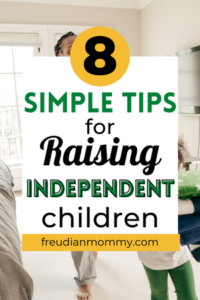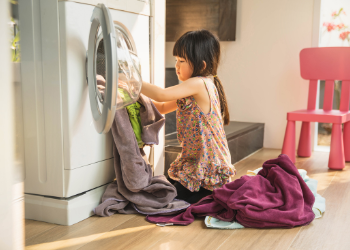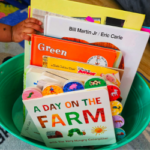I’ll be the first to admit that encouraging my daughter to do things on her own did not happen naturally; it took a lot of effort and required a significant amount of effort.
I was beside myself when I became a first-time mom in December 2016. I dreamed of becoming a mom, and nothing or no one was going to stop me from becoming the perfect PTA mom, which is how I eventually got into the habit of doing everything, I mean everything, for my daughter.
You know, from feeding her to picking up her toys on the floor, the simple tasks a 2.5-3-year-old should have been doing independently.

Being a perfect mom meant that everything had to be in place and flawless with my child. The problem was if things were going to be perfect, they had to be done by me and only me- not my husband – and most certainly not my little toddler!
Major parenting fail
I quickly realized that my way of parenting hindered my daughter’s developmental growth rather than helping her. At almost three years old, it did not occur to me that there were certain things my daughter should be doing on her own until I walked into my daughter’s daycare classroom one day and saw a child her age putting on her socks without help!
I was surprised and amazed at the same time. Now, I don’t go around comparing my kid to other children, but this phenomenon of this 2.5-year-old putting on her own socks woke me up. After that experience, I realized I was doing my daughter a complete disservice in her growth and development.
Shortly after learning my parenting techniques were not the most effective, I was on the road to helping my daughter catch up on whatever delays I had unintentionally caused.
Starting over
I started slowly encouraging my daughter to do things independently from that moment forward. We started with the basic stuff at home. Instead of me picking up her toys every night by myself, we started picking up the toys together. And eventually, she started picking up the toys on her own.
Soon after I began encouraging my daughter to become independent, she became more interested in doing more things for herself, like attempting to wash herself during bath time and getting dressed.
When a task is difficult, my daughter becomes frustrated and asks me to do it for her. And as an eager mom, if I am not intentional, I can easily fall back into old patterns. However, I catch myself and encourage her to try again until she gets it right.
Parenting is a learning experience, especially if you’re doing it for the first time. I am just glad I was able to catch myself early enough to correct the mistakes I was unintentionally making in the early developmental years of my child’s life.
8 Simple Tips for Raising an Independent Child
1) Let your child do things for themselves:

Encouraging your kids to do things for themselves is where nurturing independence begins. For instance, prompt them to get dressed on their own or pour their cereal and milk into the bowl. The more you let your kids do for themselves, the more confident they become in their abilities to take care of themselves, and the more competent and secure they become in honing their life skills.
2) Assign age-appropriate chores:
As parents, we want our kids to thrive even in our absence. If you want your kids to be more independent and self-reliant, one of the best ways to that approach is to have them participate in age-appropriate chores starting from a young age. Partaking in household chores teaches responsibility and accountability. It also increases their confidence in themselves and their abilities and gives them a chance to be challenged as well as develop their problem-solving skills. It’s also preparing them to be responsible adults and capable adults who can do for themselves. That’s the bigger picture.
3) Let them make mistakes:
I struggled to let my daughter do things independently because I wanted things done the “right way.” If we as parents don’t give our kids a chance to do things the wrong way or make mistakes, they will never learn how to do them the right way. Failing will allow your kids to develop their problem-solving skills. Plus, learning that failure is an inevitable part of life will teach your child resilience and perseverance. Remember that practice is the only way your child will learn how to master a task.

4) You are your child’s first teacher:
Your children’s education starts at home. Being independent and self-reliant are learned life skills. The sooner you start teaching your kids how to be independent and care for themselves, the sooner they can learn these skills and the more likely they are to become responsible adults.
5) Be patient with your child:
It’s much easier to do things ourselves, especially when we’re rushing out the door. But remember to be patient with your kids, encourage them and create the time and space that will allow them to try and do things independently. For example, try getting ready 10 minutes earlier than you usually do to give your kids the time and space to put on their jackets and shoes.
















